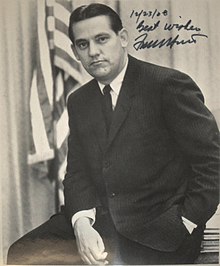Fred R. Harris
Fred R. Harris | |
|---|---|
 Harris in 1971 | |
| 32nd Chair of the Democratic National Committee | |
| In office January 14, 1969 – March 5, 1970 | |
| Preceded by | Larry O'Brien |
| Succeeded by | Larry O'Brien |
| United States Senator from Oklahoma | |
| In office November 4, 1964 – January 3, 1973 | |
| Preceded by | J. Howard Edmondson |
| Succeeded by | Dewey F. Bartlett |
| Personal details | |
| Born | Fred Roy Harris November 13, 1930 Walters, Oklahoma, U.S. |
| Political party | Democratic |
| Spouses | |
| Children | 3 |
| Education | University of Oklahoma (BA, LLB) |
Fred Roy Harris (born November 13, 1930) is an American former politician who served as a U.S. senator from Oklahoma from 1964 to 1973.[1]
Born in Walters, Oklahoma, Harris was elected to the Oklahoma Senate after graduating from the University of Oklahoma College of Law. He ousted the appointed U.S. Senate incumbent J. Howard Edmondson and won a 1964 special election to succeed Robert S. Kerr, narrowly defeating football coach Bud Wilkinson. Harris strongly supported the Great Society programs but criticized President Lyndon B. Johnson's handling of the Vietnam War. He was reelected in 1966 and declined to seek another term in 1972.
From 1969 to 1970, Harris served as chairman of the Democratic National Committee. In the 1968 presidential election, Democratic nominee Hubert Humphrey strongly considered him as his running mate. Harris unsuccessfully sought the Democratic presidential nomination in 1972 and 1976. After 1976, he became a professor at the University of New Mexico.
Early life
Harris was born on November 13, 1930, in
United States Senate

In 1964, Harris ran to serve out the unexpired term of U.S. Senator
Harris was a firm supporter of President
Despite being strongly liberal from an increasingly conservative state, he was elected to a full term in 1966, defeating attorney Pat J. Patterson, 54% to 46%. Patterson had tried to unseat Harris by announcing his support for a constitutional amendment proposed by Senator
During his Senate term, Harris also served briefly as chairman of the Democratic National Committee, preceded and succeeded in that position by Larry O'Brien. Harris was one of the final two candidates considered by Vice President and presidential nominee Hubert Humphrey to be the Democratic Party's nominee for Vice President of the United States in 1968; Humphrey chose Senator Edmund Muskie of Maine because of Harris's young age of 37.[6] According to O'Brien, Humphrey vacillated between the two until finally choosing Muskie at the last minute. Harris broke with Johnson and Humphrey over the Vietnam War.[2]
In 1970, Harris was a major player in the successful legislation to restore to the inhabitants of the
In 1971, Harris was the only senator to vote against confirmation of
Harris also called for the abolition of the Interstate Commerce Commission.[11]
Later life
Harris did not seek another Senate term in 1972, instead
After a surprising fourth-place finish in the
Harris left elective politics for academia after 1976. He became a professor of
Notes
References
- ^ Fred R. Harris, Does People Do It?: A Memoir
- ^ a b c d e f g Lowitt, Robert. "Harris, Fred Roy." Encyclopedia of Oklahoma History and Culture. Accessed October 27, 2016.
- ^ "TO PASS S. 1564, THE VOTING RIGHTS ACT OF 1965".
- ^ "CONFIRMATION OF NOMINATION OF THURGOOD MARSHALL, THE FIRST NEGRO APPOINTED TO THE SUPREME COURT". GovTrack.us.
- ^ "TO PASS H.R. 2516, A BILL TO PROHIBIT DISCRIMINATION IN SALE OR RENTAL OF HOUSING, AND TO PROHIBIT RACIALLY MOTIVATED INTERFERENCE WITH A PERSON EXERCISING HIS CIVIL RIGHTS, AND FOR OTHER PURPOSES".
- ^ Theodore H. White, The Making of the President 1968, New York: Atheneum Publishers, 1969, p.355-356
- ^ Julyan, B: New Mexico's Wilderness Areas: The Complete Guide, page 73. Big Earth Publishing, 1999
- ISBN 0-8032-2396-X, p. 90.
- ^ "Our Campaigns - Supreme Court - Associate Justice Race". ourcampaigns.com. Retrieved April 30, 2016.
- ^ Graham, Fred (December 7, 1971). "Senate confirms Powell by 89 to 1 for Black's seat". New York Times. p. 1. Retrieved February 15, 2022.
- ^ Walker, Jesse (November 1, 2009). "Five Faces of Jerry Brown". The American Conservative (November 2009). Retrieved July 22, 2019.
- ^ "Economic Democracy - Economic Populism" by Trenz Pruca, on The Daily Kos, August 21, 2011
- ^ "Economic Democracy - What Needs Doing" in Trenz Pruca's Journal, Comments and Analysis on Current Events. August 8, 2011
- ^ Jules Witcover, No Way to Pick a President: How Money and Hired Guns Have Debased American Elections, 2001, p. 166
- ^ George C. Edwards, John Howard Kessel, Bert A. Rockman, Researching the presidency: vital questions, new approaches. 1993, p. 60
- ^ "WINNOWED IN!... BUT FOR JUST HOW LONG? ... Looking forward to the second month of Primary/Caucus season 2004". thegreenpapers.com. Retrieved April 30, 2016.
- ^ "SERIOUS WINNOWING ... both on and after 'Super Duper' Tuesday". thegreenpapers.com. Retrieved April 30, 2016.
External links
- United States Congress. "Fred R. Harris (id: H000237)". Biographical Directory of the United States Congress.
- Oklahoma State University - Digital Library_Chronicles of Oklahoma - Fred Harris
- Fred R. Harris Collection and Photographs Series at the Carl Albert Center
- Voices of Oklahoma interview with Fred Harris. First person interview conducted on April 26, 2012, with Fred Harris.
- Interview with Senator Fred Harris by Stephen McKiernan, Binghamton University Libraries Center for the Study of the 1960s, July 1, 2010
- Appearances on C-SPAN

